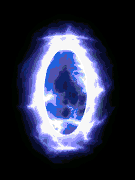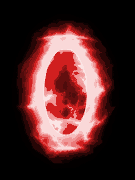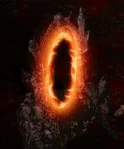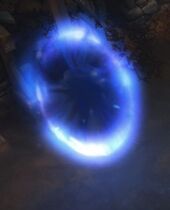(Another one... DONE. Verify please) |
Dravencour (talk | contribs) No edit summary Tag: Visual edit |
||
| (29 intermediate revisions by 8 users not shown) | |||
| Line 1: | Line 1: | ||
| + | A '''Portal''' is a [[magic]]al passage that will [[teleport]] a person, creature or cargo to another area. Unlike plain Teleport, which is transporting the bearer (or target) alone through the effort of mind and magic, Portals are gateways that can exist for continuous time. Portals can be passed through by anyone, even non-mages, if they can physically fit into the wormhole. Some portals are temporary or even one-use only, while others can exist (and remain active) for aeons. |
||
| − | A '''Portal''' is a magical passage that will [[teleport]] you another area. |
||
| ⚫ | |||
| − | ==Mechanics== |
||
| + | Portals are most often blue or red, though other variations also exist. Generally, red color indicates that the portal was opened by the magic of [[Burning Hells]], with some exceptions. |
||
| ⚫ | |||
| + | ==Diablo== |
||
| − | Portals can be either blue or red. |
||
| + | [[File:D1portal.gif|right]] |
||
| + | Blue [[Town Portal]]s were introduced in the very first ''[[Diablo]]'' and have remained a relatively consistent aspect throughout the series. |
||
| + | Town Portals can be opened with a [[Scroll of Town Portal]] to grant a quick return to [[Tristram]]. |
||
| ⚫ | |||
| + | The [[Unholy Altar]] is the only red portal in Diablo. |
||
| ⚫ | |||
| + | ==Diablo II== |
||
| − | Blue Portals were the only type of portals seen in [[Diablo 1]]. Back then, it was a castable spell as well as being available in scroll form. |
||
| + | [[File:Portal.gif|thumb|right|Blue Portal]] |
||
| + | Portals become even more predominant in ''[[Diablo II]]'' with multiple [[towns]] and many more locations available, with some being completely inaccessible until a portal to them is opened. |
||
| + | |||
| ⚫ | |||
| ⚫ | |||
Once the player summons this portal, it only dissipates if the player that cast it goes through and returns. So it is very useful in co-operative play to have 2 party members create portals so that the entire party can go back to [[town]], to [[heal]] and [[repair]]. Just make sure that the players who summoned the portals go through each other's portals and not through their own portal. |
Once the player summons this portal, it only dissipates if the player that cast it goes through and returns. So it is very useful in co-operative play to have 2 party members create portals so that the entire party can go back to [[town]], to [[heal]] and [[repair]]. Just make sure that the players who summoned the portals go through each other's portals and not through their own portal. |
||
===Red Portals=== |
===Red Portals=== |
||
| − | |||
Red Portals are more powerful and permanent portals which never dissipate unless their use is finished. |
Red Portals are more powerful and permanent portals which never dissipate unless their use is finished. |
||
They link many inaccessible areas in the world of [[Sanctuary]]. |
They link many inaccessible areas in the world of [[Sanctuary]]. |
||
| + | [[File:D2redportal.gif|thumb|Red Portal]] |
||
This is a list of all the areas linked by Red Portals: |
This is a list of all the areas linked by Red Portals: |
||
| + | * [[Tristram]] (This is the first red portal seen in Diablo II) |
||
| − | |||
| − | * [[Tristram]] |
||
* [[Canyon of the Magi]] |
* [[Canyon of the Magi]] |
||
| ⚫ | |||
* [[Harrogath]] |
* [[Harrogath]] |
||
| − | * [[ |
+ | * [[Abaddon]] |
| − | * [[ |
+ | * [[Pit of Acheron]] |
| − | * [[ |
+ | * [[Infernal Pit]] |
* [[Nihlathak's Temple]] |
* [[Nihlathak's Temple]] |
||
| + | * [[Terror's End]] / [[Cutscene|Destruction's End]] (These portals do not lead to any location, but instead open the final cinematic for the game and expansion respectively; Terror's End is replaced with portal to Harrogath in the expansion) |
||
* [[Moo Moo Farm]] |
* [[Moo Moo Farm]] |
||
| + | The portal to Tristram can only be opened by touching the [[Cairn Stones]] in a specific order, as found within the [[Scroll of Inifuss]]. This can only be done whilst one the [[Search for Cain (quest)|Search for Cain]] quest. |
||
| ⚫ | |||
| + | |||
| + | The portal to the hidden Canyon of the Magi is opened by reading [[Horazon's Journal]] within the [[Arcane Sanctuary]]. Note that the journal is guarded by [[The Summoner]]. To get to the Arcane Sanctuary, players must find a hidden portal beneath the [[Lut Gholein]] Palace (in the former cellar of an ancient [[Vizjerei]] fortress). |
||
| + | |||
| + | [[File:Infernalgate2.JPG|thumb|right|150px|The Infernal Gate]] |
||
| ⚫ | |||
| ⚫ | |||
| − | The portal to the Pandemonium Fortress is a special portal because it was summoned by the [[Prime Evils]] themselves. Otherwise, it is just another red portal. Similarly, the portal to Harrogath is summoned by [[Tyrael]] and disappears when the [[Waypoint]] at Harrogath is activated. |
||
| ⚫ | |||
| ⚫ | |||
| + | ===Infernal Gate=== |
||
| ⚫ | |||
| + | [[File:Infernalgate1-0.JPG|thumb|149x149px|A picture of an Infernal Gate]] |
||
| + | In addition to the more typical portals, the [[Pandemonium Fortress]] in the [[The Harrowing|fourth act]] is reached by entering the [[Infernal Gate]], ritually summoned by the three [[Prime Evils]]. It is also the namesake of the third act: [[The Infernal Gate]]. It is red-orange and horrific to behold. |
||
| + | In-game, this gate is simply labeled as "Portal". |
||
| + | ==Diablo III== |
||
| + | [[File:200px-Sorportal.jpg|thumb|right|170px|Town Portal]] |
||
| + | In addition to waypoints and Town Portals (which can now be summoned at will, without scrolls), some portals also exist in [[Diablo III]], leading to following locations: |
||
| + | *[[Archives of Zoltun Kulle]] and subzones ([[Unknown Depths]], [[Storm Halls]] and [[Soulstone Chamber]]) |
||
| + | *[[Realm of Shadow]] |
||
| + | *Realms of Chaos, Discord, Turmoil and Fright (opened by [[Infernal Machine]] in Heretic's Abode, [[New Tristram]]) |
||
| + | *[[High Heavens]] (opened by [[Diablo]] at the top of the [[Bastion's Keep Watchtower]] at the end of [[Act III (Diablo III)|Act III]]) |
||
| + | *Unknown location (opened by [[Adria]]) |
||
| + | *[[Hell Rift]]s |
||
| + | *[[Gardens of Hope]] (opened by [[Auriel]] or connecting the two tiers) |
||
| + | *[[Silver Spire]] (including [[Great Span]]) |
||
| + | *[[Battlefields of Eternity]] |
||
| ⚫ | |||
| + | *[[Realm of the Banished]] (opened by [[Realmwalker]]) |
||
| + | *[[Pandemonium Fortress]] (including traveling between its levels and to the [[Heart of the Fortress]]) |
||
| + | *[[Malthael]]'s portal used to transport the [[Black Soulstone]] to [[Sanctuary]] and back |
||
| + | *[[Treasure Realm]] |
||
| + | *[[Not The Cow Level]] |
||
| + | *[[Nephalem Rift]]s and [[Greater Rift]]s |
||
| + | *[[Set Dungeon]]s |
||
| + | *[[Forsaken Repose]] and back to [[Greyhollow Island]] |
||
| + | *Secret arenas: [[Leoric's Gardens]], [[The Killing Grounds]], [[Blighted Sewer]], [[The Archives]], [[The Bound Keep]], [[Nephalem Proving Ground]] |
||
| + | *[[The Darkening of Tristram]] (time-lost version of [[Tristram]]) |
||
[[Category:Environment]] |
[[Category:Environment]] |
||
Revision as of 04:37, 10 October 2017
A Portal is a magical passage that will teleport a person, creature or cargo to another area. Unlike plain Teleport, which is transporting the bearer (or target) alone through the effort of mind and magic, Portals are gateways that can exist for continuous time. Portals can be passed through by anyone, even non-mages, if they can physically fit into the wormhole. Some portals are temporary or even one-use only, while others can exist (and remain active) for aeons.
Portals, like Waypoints, transport the player to another location. One key difference between them is that Waypoints can only teleport the player to areas that he/she has already been to, while portals are sometimes the only way to new or inaccessible areas.
Portals are most often blue or red, though other variations also exist. Generally, red color indicates that the portal was opened by the magic of Burning Hells, with some exceptions.
Diablo
Blue Town Portals were introduced in the very first Diablo and have remained a relatively consistent aspect throughout the series.
Town Portals can be opened with a Scroll of Town Portal to grant a quick return to Tristram.
The Unholy Altar is the only red portal in Diablo.
Diablo II

Blue Portal
Portals become even more predominant in Diablo II with multiple towns and many more locations available, with some being completely inaccessible until a portal to them is opened.
Blue Portals
Blue portals are always Town Portals, and thus give access to the Act's respective towns. They can be summoned by NPCs, certain Shrines, as well as players by use of a Scroll of Town Portal.
Once the player summons this portal, it only dissipates if the player that cast it goes through and returns. So it is very useful in co-operative play to have 2 party members create portals so that the entire party can go back to town, to heal and repair. Just make sure that the players who summoned the portals go through each other's portals and not through their own portal.
Red Portals
Red Portals are more powerful and permanent portals which never dissipate unless their use is finished.
They link many inaccessible areas in the world of Sanctuary.

Red Portal
This is a list of all the areas linked by Red Portals:
- Tristram (This is the first red portal seen in Diablo II)
- Canyon of the Magi
- Harrogath
- Abaddon
- Pit of Acheron
- Infernal Pit
- Nihlathak's Temple
- Terror's End / Destruction's End (These portals do not lead to any location, but instead open the final cinematic for the game and expansion respectively; Terror's End is replaced with portal to Harrogath in the expansion)
- Moo Moo Farm
The portal to Tristram can only be opened by touching the Cairn Stones in a specific order, as found within the Scroll of Inifuss. This can only be done whilst one the Search for Cain quest.
The portal to the hidden Canyon of the Magi is opened by reading Horazon's Journal within the Arcane Sanctuary. Note that the journal is guarded by The Summoner. To get to the Arcane Sanctuary, players must find a hidden portal beneath the Lut Gholein Palace (in the former cellar of an ancient Vizjerei fortress).

The Infernal Gate
The portals to Abbadon, the Pit of Acheron and the Infernal Pit are extra areas that can be used for levelling and item hunting.
It may be useful to know that the portal to Nihlathak's Temple will not close unless the Waypoint at the Halls of Pain is activated. This may be useful to farm Pindleskin, a unique monster famous for high level drops.
The portal to the Moo Moo Farm is created by transmuting a Tome of Town Portal with Wirt's Leg in the Horadric Cube. It gives access to the legendary Secret Cow Level.
Infernal Gate

A picture of an Infernal Gate
In addition to the more typical portals, the Pandemonium Fortress in the fourth act is reached by entering the Infernal Gate, ritually summoned by the three Prime Evils. It is also the namesake of the third act: The Infernal Gate. It is red-orange and horrific to behold.
In-game, this gate is simply labeled as "Portal".
Diablo III

Town Portal
In addition to waypoints and Town Portals (which can now be summoned at will, without scrolls), some portals also exist in Diablo III, leading to following locations:
- Archives of Zoltun Kulle and subzones (Unknown Depths, Storm Halls and Soulstone Chamber)
- Realm of Shadow
- Realms of Chaos, Discord, Turmoil and Fright (opened by Infernal Machine in Heretic's Abode, New Tristram)
- High Heavens (opened by Diablo at the top of the Bastion's Keep Watchtower at the end of Act III)
- Unknown location (opened by Adria)
- Hell Rifts
- Gardens of Hope (opened by Auriel or connecting the two tiers)
- Silver Spire (including Great Span)
- Battlefields of Eternity
- Pandemonium
- Realm of the Banished (opened by Realmwalker)
- Pandemonium Fortress (including traveling between its levels and to the Heart of the Fortress)
- Malthael's portal used to transport the Black Soulstone to Sanctuary and back
- Treasure Realm
- Not The Cow Level
- Nephalem Rifts and Greater Rifts
- Set Dungeons
- Forsaken Repose and back to Greyhollow Island
- Secret arenas: Leoric's Gardens, The Killing Grounds, Blighted Sewer, The Archives, The Bound Keep, Nephalem Proving Ground
- The Darkening of Tristram (time-lost version of Tristram)

